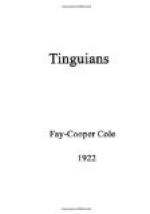Families of means attain a social standing above that of their less fortunate townsmen, but there is no sharp stratification of the community into noble and serf, such as was coming into vogue along many parts of the coast at the time of the Spanish conquest, neither has slavery ever gained a foothold with this people. The wealthy often loan rice to the poor, and exact usury of about fifty per cent. Payment is made in service during the period of planting and harvesting, so that the labor problem is, to a large extent, solved for the land-holders. However, they customarily join the workers in the fields and take their share in all kinds of labor.
The concubines, known as pota (cf. p. 283), are deprived of certain rights, and they are held somewhat in contempt by the other women, but they are in no sense slaves. They may possess property, and their children may become leaders in Tinguian society.
The only group which is sharply separated from the mass is composed of the mediums, and they are distinctive only during the ceremonial periods. At other times they are treated in all respects as other members of the community.
On three occasions the writer has found men dressing like women, doing women’s work, and spending their time with members of that sex. Information concerning these individuals has always come by accident, the people seeming to be exceedingly reticent to talk about them. In Plate XXXVI is shown a man in woman’s dress, who has become an expert potter. The explanation given for the disavowal of his sex is that he donned women’s clothes during the Spanish regime to escape road work, and has since then retained their garb. Equally unsatisfactory and unlikely reasons were advanced for the other cases mentioned.
It should be noted that similar individuals have been described from Zambales, Panay, from the Subanun of Mindanao, and from Borneo. [169] It has been suggested, with considerable probability, that at least a part of these are hermaphrodites, but in Borneo, where they act as priests, Roth states that they are unsexed before assuming their roles.
Laws.—Law, government, and custom are synonymous. Whatever the ancestors did is right, and hence has religious sanction. The lakay and his advisors will give their decisions according to the decrees of the past, if that is possible, but when precedent is lacking, they will deliberate and decide on a course. The following may be taken as typical of the laws or customs which regulate the actions of the people, within a group, toward one another.
Rules governing the family.—A man may have only one wife, but he may keep concubines. If the wife’s relatives suspect that a mistress is causing the husband’s affections to wane, they may hold the Nagkakalonan or “trial of affection” (cf. p. 282), and if their charges are sustained, the husband must pay them a considerable amount, and, in addition, stand all the expenses of the gathering. If it is shown that they are not justified in their suspicions, the expense falls on the accusers.




